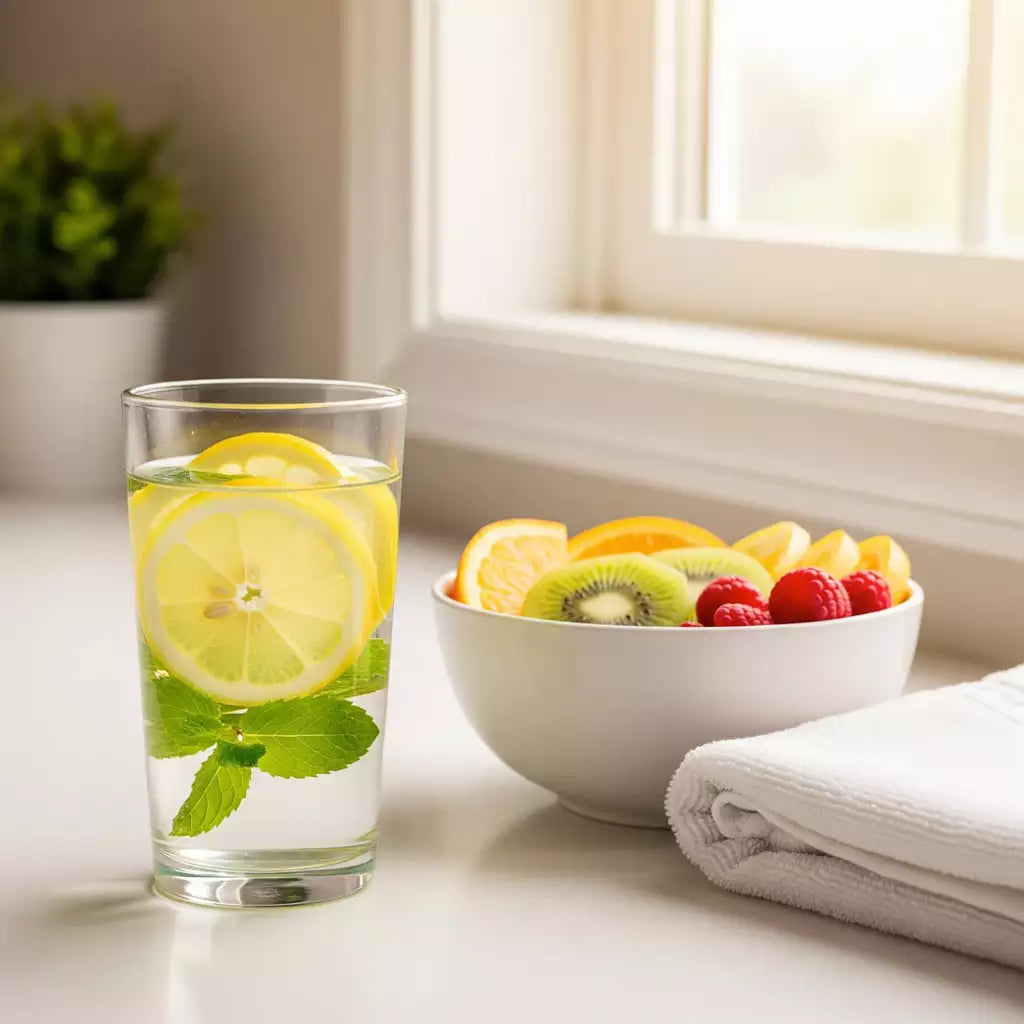
The Link Between Hydration, Digestion, and Energy
SHARE THIS POST
Most people reach for coffee or energy drinks when fatigue hits, but the real culprit behind that afternoon crash might be much simpler: dehydration.
Your body is over 60% water, and even slight imbalances in hydration can throw off your digestion, zap your energy, and make you feel sluggish—mentally and physically.
Understanding how hydration affects digestion and energy is key to feeling your best. In this post, we’ll break down the science, highlight the differences between electrolytes vs. vitamins, and share natural solutions from Calmour’s wellness collection to help you stay sharp, fueled, and functioning.
Why Hydration Matters More Than You Think
Hydration isn’t just about drinking water when you’re thirsty. Every system in your body—your gut, brain, muscles, and metabolism—relies on fluid balance to operate efficiently.
When you're even mildly dehydrated, you can experience:
- Slower digestion and bloating
- Brain fog and mood dips
- Fatigue or energy crashes
-
Headaches and lightheadedness
If you’ve ever felt tired after a meal or sluggish during travel, hydration might be the missing link. Supporting hydration and digestion together can help your body better absorb nutrients, eliminate waste, and keep your energy steady throughout the day.
Hydration and Digestion: The Gut-Body Connection
Let’s start with your gut. Water plays a critical role in digestive processes—from breaking down food to moving it through your intestines. Insufficient fluid intake can lead to slower gastric emptying, constipation, and even malabsorption of nutrients.
Hydration supports:
- Saliva production for initial digestion
- Stomach acid balance, which breaks down protein
- Nutrient transport, including vitamins and minerals
-
Smooth muscle contractions in the intestines, aiding regularity
If you’re not drinking enough water, your body will divert fluids to more critical systems—leaving your digestive system operating below capacity.
👉 For quick, natural relief, consider Calmour’s Anti-Gas Quick-Dissolving Oral Strips, which help reduce bloating and support smoother digestion.
How Water Affects Energy (More Than Caffeine Does)
Fatigue isn’t always about sleep. In many cases, low energy can be traced back to poor hydration. Dehydration thickens your blood, making your heart work harder and slowing oxygen delivery to your cells. This leads to that sluggish, drained feeling that no amount of coffee can fix.
Here’s how hydration powers your energy levels:
- Improves nutrient absorption so cells get the fuel they need
- Regulates blood pressure and oxygen delivery
- Supports mitochondrial function—your body’s energy factories
-
Reduces muscle cramps and physical fatigue during activity
👉 Instead of another shot of espresso, try a glass of water and a Calmour Green Tea Energy Brew Strip. It’s a cleaner way to support energy—without the dehydration that comes with high-caffeine drinks.
✨ Check out our full article on natural energy boosters to learn more.
Electrolytes vs. Vitamins: What’s the Difference?
Hydration isn’t just about water. Electrolytes—like sodium, potassium, magnesium, and chloride—are minerals that help your body retain fluids and keep cells functioning properly. Without them, water can’t move efficiently between cells.
Vitamins, on the other hand, don’t regulate fluid balance directly, but they’re essential for:
- Converting food into energy
- Supporting immune health
- Maintaining nervous system function
|
Electrolytes |
Vitamins |
|
Regulate hydration and nerve signals |
Support immunity, energy, and repair |
|
Help prevent cramps and fatigue |
Aid metabolism and brain function |
|
Must be replenished after sweating |
Can be water- or fat-soluble |
|
Found in mineral water, fruits, salts |
Found in whole foods and supplements |
👉 For optimal support, your body needs both. Calmour’s Instant Energy Vitamin B12 Strips support energy and nervous system health—especially when paired with adequate fluids and electrolytes throughout the day.
Real-World Tips to Support Hydration, Digestion, and Energy
If you’re constantly feeling bloated, tired, or foggy—especially mid-day or after meals—try these simple tips:
✅ Drink 8–12 oz of water 30 minutes before meals
Helps prep the digestive tract and prevent overeating.
✅ Start your day with water + electrolytes
Try a pinch of sea salt and a squeeze of lemon or an electrolyte powder to rehydrate after sleep.
✅ Pair water with fast-absorbing supplements
Calmour’s B12 and Green Tea Strips dissolve quickly and are most effective when you’re hydrated.
✅ Limit caffeine and alcohol
These act as diuretics and increase fluid loss—potentially worsening digestion and fatigue.
✅ Keep digestion smooth
Pack Calmour’s Anti-Gas Strips when traveling or after a heavy meal to support gut comfort.
How to Tell If You're Dehydrated (Even Slightly)
Not sure if hydration is affecting your digestion and energy? Here are subtle signs:
- Dry lips or mouth
- Headaches or brain fog
- Fatigue after meals
- Constipation or hard stools
- Dizziness when standing
-
Craving salty foods
If any of these sound familiar, increasing your water intake and adding supportive supplements could make a huge difference.
A Smarter Approach to Wellness
Hydration, digestion, and energy are all connected. Supporting one naturally improves the others.
If you’re ready to break the cycle of bloating and burnout, try pairing a solid hydration habit with Calmour’s targeted wellness support.
Whether it’s a Green Tea Energy Strip to replace your afternoon coffee, a Vitamin B12 strip for daily metabolic support, or Anti-Gas strips to ease digestive discomfort, our fast-acting, portable solutions are made to work with your body—not against it.



